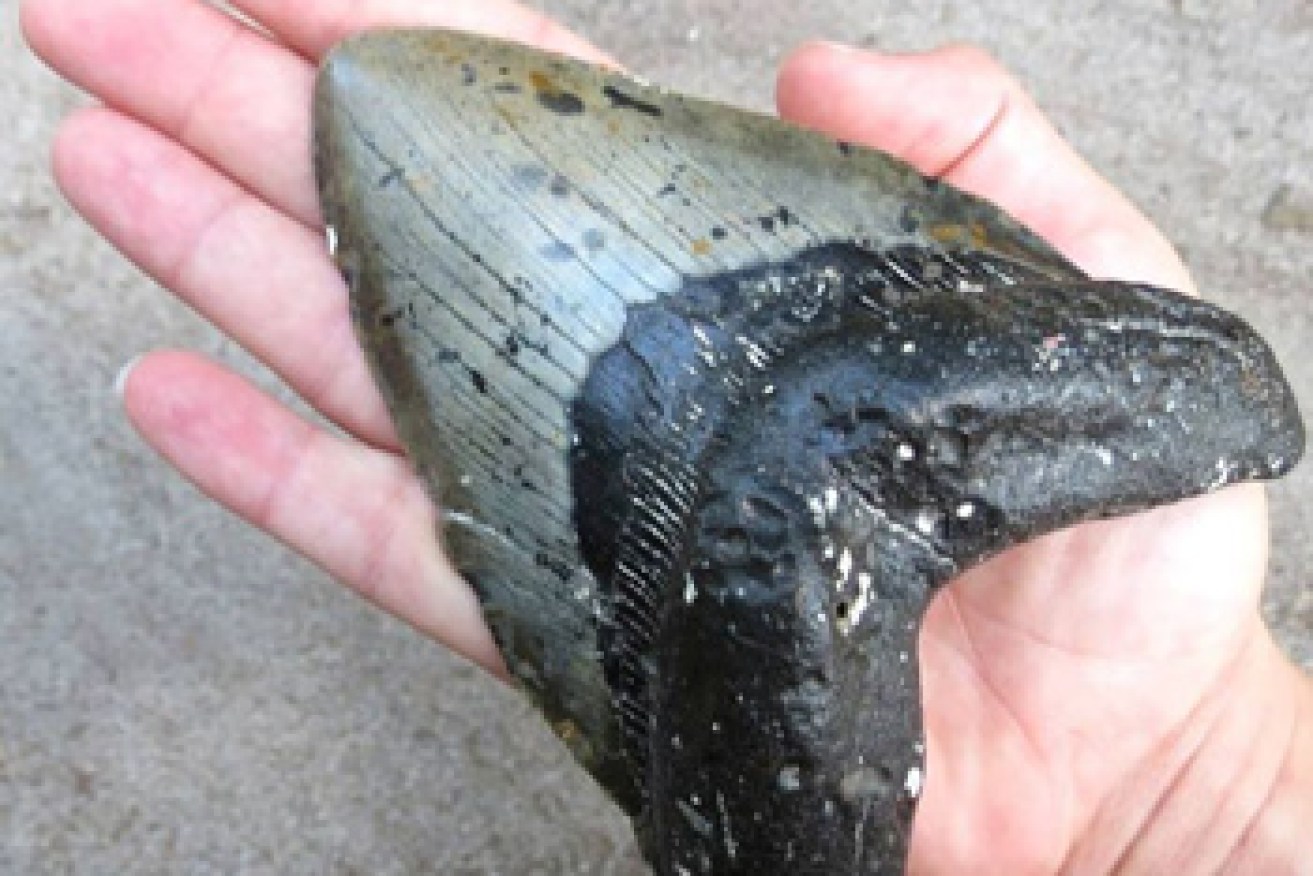This is the greatest shark to ever live


Local media reported this as one of the washed up Megalodon teeth.
A freakish discovery of fossilised teeth on a beach last week has stunned the world, reminding us of a giant prehistoric beast that once ruled the seas.
The six-inch-long teeth came from the modern great white shark’s 25-metre-long ancestor, the Megalodon, which roamed the seas approximately 15 to 2.6 million years ago.
• ‘Supershark’ the size of Jaws found in USA
• Divers capture footage of ‘The Swimming Head’
• Giants from the abyss still haunt our planet
Denny Bland was one of the lucky beachgoers at North Topsail Beach in North Carolina, US who made the rare discovery of teeth the size of a chihuahua on October 20.
“I felt like I was a lottery winner,” Mr Bland told local network WITN.

Local media reported this as one of the washed up Megalodon teeth.
“It’s like I’m the first one to touch that since it fell out of his mouth back in the day.”
It is thought that recent tropical storms on the US eastern seaboard, especially Hurricane Joaquin that caused severe rainfall along the East Coast earlier this month, dredged up fossils in the Atlantic seabed.
Megalodon (taxonomically C. megalodon) was one of the fiercest predators to ever roam the earth and is thought to have feasted on small whales, dolphins and giant sea turtles.
It is estimated to have weighed anywhere between 50 and 100 tonnes, dwarfed only by the blue whale, which can easily weigh up to 180 tonnes.
A 2008 study published in the Journal of Zoology used computer modeling to show that Megalodon had an estimated maximum bite force of between 100,000 to 180,000 Newtons, or 10 to 18 tonnes. This puts the ferocious T. Rex to shame, which scientists believe had a maximum bite force of around 35,000 to 57,000 N.
In his book Shark: A Visual History, marine biologist Richard Ellis described the megashark as potentially the “ultimate monster” of the deep.
“Perhaps of all the monsters, the giant shark is the most enduring,” Mr Ellis wrote.
“It incorporates virtually every element that we require of our mythological sea beasts: great size, mysterious habits, verified anthropophagous [human-eating] inclinations, and a history that goes back to the beginnings of record time.

An artist’s impression of the creature’s size compared to a human. Photo: Daryl Toh / tumblr
“More than leviathan, more than the sea serpent, more than the Kraken, Megalodon may be the ultimate monster.”
The teeth of the megashark differ greatly from those of our current oceanic king, the Great White. The Megalodon’s are thicker, broader – and far, far bigger. For these and other reasons, it is not thought to be a direct ancestor of the white pointer.
In older times, its teeth may have fuelled humanity’s belief in dragons. Their teeth were sometimes mistaken for the fangs of fire-breathers, Discovery Channel’s Sharkopedia reported.
There have been alleged Megalodon sightings, with amateur video footage emerging as recently as March this year, although marine biologists and shark experts have dismissed such claims.
In his book, Mr Ellis outlined the minimum proof that would be needed for such a claim.
“Only the discovery of a fresh, white megalodon tooth would confirm the creature’s current existence,” he wrote.
Because sharks have cartilage, not bone, the Megalodon is known by its fossil teeth, such as the specimens found last week.
To date, all these teeth have been made of black stone instead of white dentine and enamel – the result of millions of years of fossilisation.
Sadly, it seems the ocean’s “ultimate monster” is long dead, but certainly not forgotten.
—with Jackson Stiles









